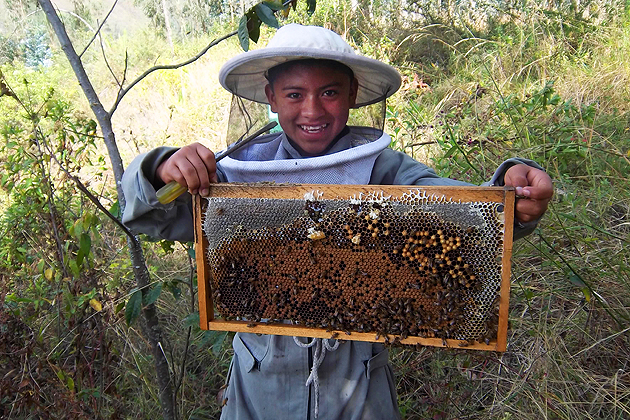
Elizabeth Clark ’09 (CANR), a Peace Corps volunteer in rural Ecuador, has started a beekeeping cooperative with a group of local families.
The honey generated by the bees will be sold to local stores and will provide an income for the 18 families. The project is funded through the Peace Corps Partnership Program, which raises money for Peace Corps volunteer community projects.
Clark, a Coventry, Conn. native, earned her degree in natural resources management and engineering. She had no previous beekeeping experience, but a UConn entomology course sparked her interest in insects.
Through the cooperative, local farmers in Cahuasqui, Ecuador, will be trained in basic beekeeping, tending bee hives, maintaining healthy bees, extracting and harvesting honey, and safety procedures. Additional workshops will be held so other members of the community can also learn beekeeping skills.
The money raised through the Peace Corps Partnership Program will cover initial costs associated with beekeeping, including the purchase of bees and hives, materials used to extract honey, and safety equipment.
“Working in a group will allow cooperative members to collaborate and exchange advice, as well as sell honey in bulk to larger organizations,” says Clark. “The project provides a unique opportunity to families that may not have funding to buy their own beekeeping equipment.”

In order to receive funding through the Peace Corps Partnership Program, a community must make a 25 percent contribution to the total cost of the project, and specify indicators of project for the individual projects. The Cahuasqui community is responsible for purchasing 25 percent of the bees and additional equipment, to promote a sense of ownership in the project and increase the chance of long-term sustainability.
Clark says some families became discouraged after they learned of the required contribution. Still, “Everyone was interested in receiving discounted bees!” she says.
The cooperative is in its early phases but shows potential, Clark says. “The community members who are already involved in beekeeping are serving as advisors for those who don’t any experience.”
Clark is passionate about the project. “If the cooperative is properly implemented,” she says, “the families will have another source of income and will be more motivated to preserve the natural environment with bees as their main source of pollination.”
Another perk for Clark is that she feels she is leaving her mark. “This way I’m helping the community, working with them, not just creating something that they will use after the fact,” she says. “I’m helping them create a better future.”
More than 5,910 Peace Corps volunteers have served in Ecuador since the program was established in 1962. Volunteers in this South American nation work in the areas of youth and community development, environmental and agricultural conservation, HIV/AIDS outreach, and health education. Currently, 188 volunteers are serving in Ecuador. All volunteers are trained in Spanish and some are also trained in the Kichwa language.
One-hundred percent of each tax-deductible donation to the Peace Corps Partnership Program goes toward a development project. Those interested in supporting Clark’s project in Ecuador can visit www.peacecorps.gov/donate . Clark’s project is number 518-375.


